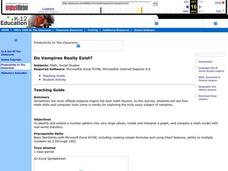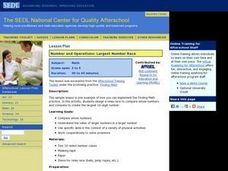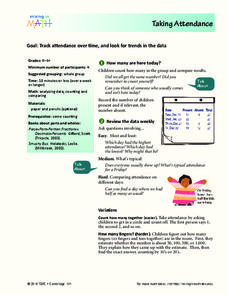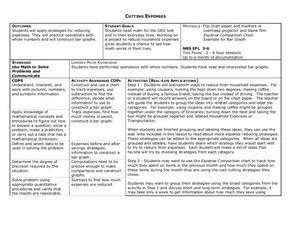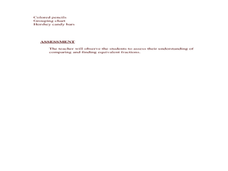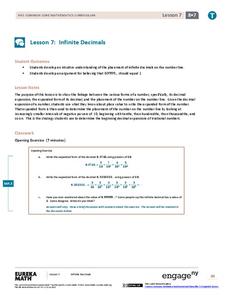Curated OER
Comparing and Ordering Fractions
Students compare and organize different fractions. In this fraction instructional activity, students use wax paper divided into squares to represent fractions. Students put them in different orders based on their value to complete...
Curated OER
Adding and Subtracting With Negative Numbers
Students solve equations with negative numbers. In this addition and subtraction instructional activity, students review how to add and subtract with positive and negative numbers on a number line. Students discuss the outcomes of adding...
Curated OER
Do Vampires Really Exist?
Students identify and extend a number pattern into very large values. They create and interpret a graph based on their number patterns. Students compare a math model with real-world statistics about the existence of vampires.
Curated OER
What's the Price?
Fourth graders learn about price and comparative shopping. In this price and comparative shopping lesson, 4th graders read Amy Axelrod's, Pigs Go To Market: Fun with Math and Shopping. They use the book to investigate the meaning of...
Curated OER
Variety of Fractions
Students play a fraction game. In this improper and mixed fractions lesson, students discuss the fractions 1/3, 4/3 and 1 1/3. Students learn about the differences between proper fractions, improper fractions and mixed fractions. ...
Curated OER
Time for a Plumber!
Fourth graders compare amounts of time in seconds, minutes and hours. In this multiplying and comparing time lesson, 4th graders problem solve a plumbing problem scenario to find which amount of time is the least. Students share their...
Curated OER
Jelly Bean Math
Students estimate, measure, compute, and create patterns using jelly beans. In small groups, they solve various calculations, place jelly beans into groups, invent a new flavor, create a pattern, and complete a worksheet.
Curated OER
Unit Rates
Students calculate unit rates with fractions and whole numbers. For this algebra lesson, students compare numbers, perform long division, and calculate the rate of different units through conversions. They model some of the problems as...
Curated OER
Number and Operations- Largest Number Race
Students participate in a race to compare whole numbers. In this number operations lesson, students create the largest 10-digit number and discuss how they constructed the largest number.
Curated OER
It Counts
Students assign numbers to describe objects. In this number lesson, students assign numbers to objects and compare more, less, and equal values. They write down descriptions of plants including the number of leaves and height of the...
Curriculum Corner
Guest Teacher Plans: Grade 6
Taking a day off of school can feel like a lot more work than going because of the time and effort that goes into making sub plans. Make your life easier with a daily plan for a guest teacher designed to meet the needs of sixth graders...
NTTI
If You Hopped Like a Frog
Get your frogs hopping by introducing them to the concepts of ratio and proportion. As a class, they perform arithmetic operations using ratios then discover how they represent quantitative relationships. In groups, they write their own...
Curated OER
Taking Attendance
Young mathematicians record and analyze data. They will take attendance for their class and compare to other days. Then discuss ways to count who is present. They may also show the amount of learners present using fractions.
Curated OER
The History of Mathematics
Research the interrelationship between math and science. Search the Internet to discover the history of several branches of mathematics and make text-to-world connections between the concepts covered in each branch with related...
Curated OER
Equivalent Fraction Paper Strips
Young learners compare the relative values of fractions by making physical representations. They fold and label strips of paper that are equal in length to represent "one whole" and the equal parts that fractions represent. Also, they...
Curated OER
An Apple a Day
Students sort and compare apples before making apple prints. In this apple lesson, students use a painting to inspire art prints made with apple halves. Students compare and sort apples.
Curated OER
Cutting Expenses
Students explore budgeting. In this finance and math lesson plan, students brainstorm ways in which households could save money. Students view websites that give cost reducing ideas. Students complete an expense comparison chart and use...
Curated OER
Hershey Bar Equivalent Fractions
Fourth and fifth graders explain how to use equivalent fractions. They recognize which fractions are equivalent. Pupils find equivalent fractions.
Alabama Learning Exchange
Understanding Fractions
Young learners explore fractions and demonstrate parts of a whole by using a candy bar and a piece of paper and dividing both into equal parts. Included is a worksheet that requires youngsters to color in half of each polygon shape. Some...
Curated OER
Making Simple Conversions
Young scholars explore the concept of measurement as it relates to equivalencies. They complete simple conversions using visual models of measurement units, and record their answers in a two-column table.
EngageNY
Decimal Expansions of Fractions, Part 2
Develop your pupils' understanding of fractions and their decimal equivalence using the 12th instructional activity in this series. Scholars learn an alternative to long division that results in converting fractions to decimals that...
EngageNY
Infinite Decimals
Can you support the argument that the decimal 0.99999 ... is equivalent to the number one? The seventh installment in this 25-part module gives convincing support for this conclusion. Pupils write infinite decimals using powers of 10....
Curated OER
Division by Fractions (Part Two)
Investigate division through the use of array models. The lesson focuses on using area models to compare division as sharing with division as grouping. Students evaluate the usefulness and limitations of the two array models.
Curated OER
How Many?
Establish 1:1 correspondence by counting students, first one gender, then the other. Give each child a colored cube (one color for boys, another for girls) and have small groups determine more or less and how many all together. As a...




